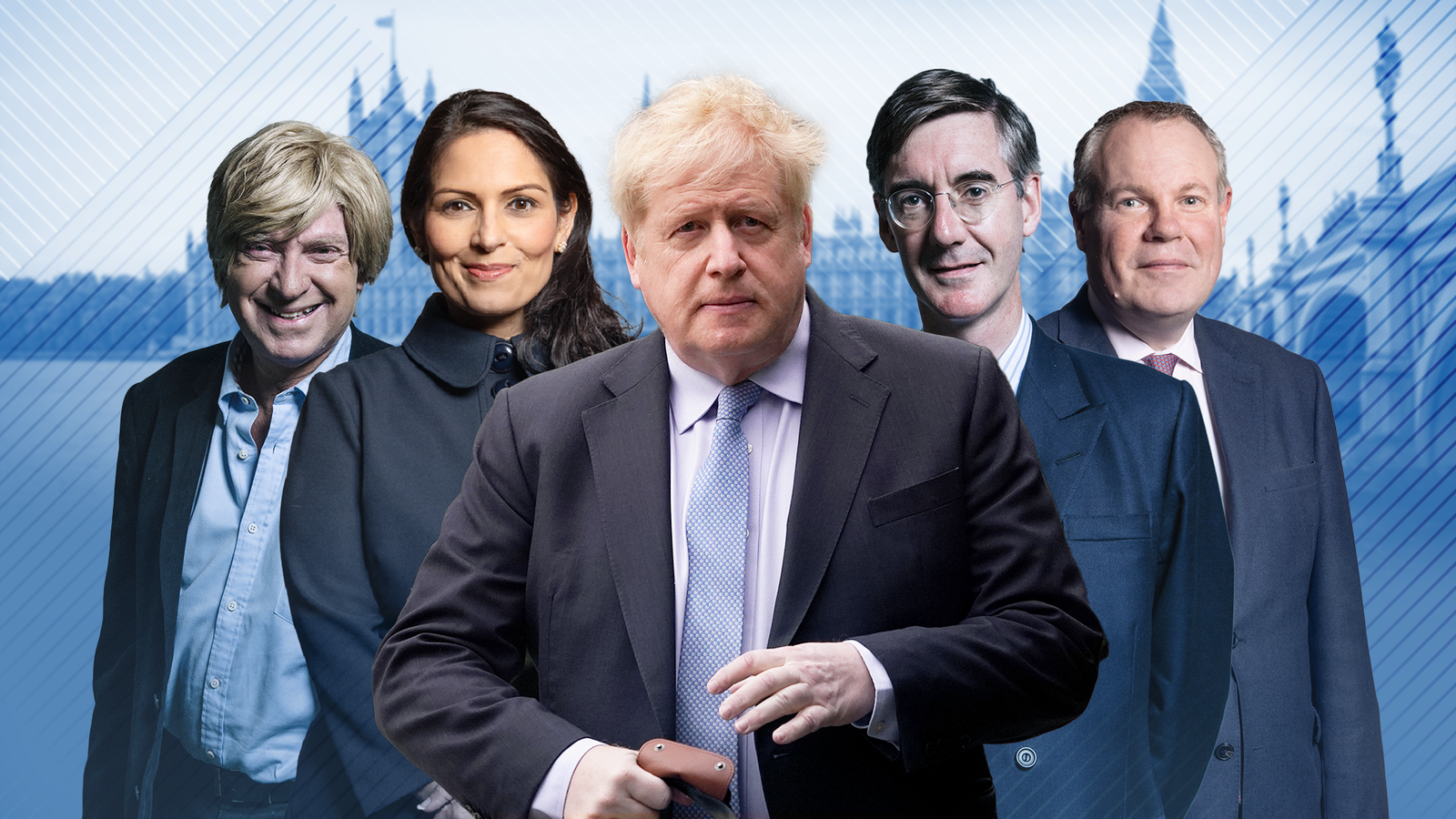Rishi Sunak wanted to set out with a fresh style of conservative leadership based on integrity, professionalism and accountability.
This is proving difficult because the prime minister keeps being buffeted by after-shocks generated by his predecessors.
He has to contend not just with the lingering stench of their misrule but with continuing reverberations from the privilege and patronage which they still enjoy.
First, there was Boris Johnson’s 45-person strong resignation honours list.
Now the prime minister will find it impossible to satisfy all sides of his Conservative party by the position he takes in the vote on the Privileges Committee report into Johnson’s deliberate misleading of parliament.
Next Sunak will have to explain away another resignation honours list, this time from Liz Truss, the UK’s shortest-serving prime minister in history.
Her nominations are currently under review by the House of Lords Appointments Committee (HOLAC).
Partygate: Conservative Party staff filmed drinking and dancing during COVID lockdown
Boris Johnson ‘calling off the dogs’ from attacking privileges committee report
Boris Johnson in ‘clear breach’ of rules after Daily Mail job announced, says MP watchdog
Peerages are a different matter to other honours
Throughout human history, people have wanted to take titles and wear ornaments to make them stand out from the crowd.
Most honours originated as rewards from the tribal chieftain, given in direct contact with them. That is how honours started in this country.
Read more by Adam Boulton:
Politicians are drawn to WhatsApp – it may stop us ever knowing whole truth
Sir Keir Starmer risks complacency by suggesting job all but done after local elections
Today defenders of the UK honours system point, with justification, to the hitherto unsung men and women giving exceptional service to the community who at last receive a nod of recognition with an MBE or OBE – the Order of the British Empire.
The better-connected get CBEs or are made “Sir” or “Dame”.
These honours are still bestowed by representatives of the Royal Family but they are now selected and approved by the government of the day.
These non-political awards are innocuous and make up the majority of an honours list.
Most other countries have similar systems such as France’s Legion d’honneur and the congressional and presidential medals of honour in the United States.
Please use Chrome browser for a more accessible video player
The concerns arise over the special privileges and so-called “honours” with which Britain’s politicians reward themselves and their apparatchiks in the House of Lords. A process highlighted in the so-called “resignation” and “dissolution” lists which outgoing prime ministers hand out when they step down.
Eyebrows may be raised at honours secured by both Boris Johnson and Cherie Blair for their hairdressers, but such awards are of little consequence.
Peerages are a different matter. They are not simply awards of a title. They come, unelected, with a lifelong right to take part in the democratic process of making the laws of the country.
Johnson wanted more, including a gong for his father Stanley, but his list, finally waved through by HOLAC and Sunak, included 6 MBEs, 11 OBEs, 8 CBEs, 6 Knights, 5 Dames and 7 peerages.
A further eight peerages did not pass muster and were rejected.
There has been particular controversy over four sitting MPs, including Nadine Dorries, who were blocked on the grounds that it is illegal to hold seats simultaneously in both houses of parliament.
Click to subscribe to the Sky News Daily wherever you get your podcasts
Sunak attempted to stay out of it by following the recommendations of HOLAC. Johnson argues that he should simply have overruled the committee, as he did to create Lord Cruddas.
The prime minister currently has the power to do so, although the Lord’s Speaker John McFall is pressing to make its rulings legally binding.
Honours feed the bloated House of Lords
A seat for life on the red benches of the House of Lords is not an “honour” at all, however puffed up its recipients may feel.
They are political appointees in the gift of the prime minister.
Resignation honours are their last chance for patronage, increasingly popular with recent premiers.
Harold Wilson, who resigned twice, nominated a total of 17, Thatcher 7, Major 10, Cameron 16 and May 19.
Neither Tony Blair nor Gordon Brown gave out resignation honours, although they created many peerages for allies and people they wanted to kick upstairs in the regular lists of so-called “working peers”.
These largely futile efforts to rebalance the political complexion of the Lords have resulted in the Upper House bloating in size to more than 800 members – a world record for a legislative chamber beaten only by China’s National People’s Congress.
Please use Chrome browser for a more accessible video player
Lords are entitled to up to £342 for each day of attendance.
Whether it is appropriate or not for her to have an honours list after only 49 days at the top, Truss is going ahead with rewards for her mates including four nominations for the Lords: Mark Littlewood, Ruth Porter, Matthew Elliott and Jon Moynihan.
All of them have links to right-wing, neo-liberal think tanks, which provided the intellectual clothes in which Truss dressed herself to beat Sunak to the Conservative leadership – ideas which he dismissed then prophetically as “fairytale economics”.
Moynihan, Littlewood and Porter are all associated with the right-wing Institute of Economic Ideas – a key pressure group for Brexit and Trussonomics.
Financier Moynihan is an IEA trustee who donated £100,000 to Truss’s leadership campaign.
Libertarian chain-smoker Littlewood is IEA Director General and a friend of Truss since their university days.
Porter has a background in financial and political PR and was Truss’s deputy chief of staff in Number 10.
Elliott was a founder of the Taxpayers Alliance, Big Brother Watch and Business for Britain. He is best known for heading Vote Leave during the EU referendum, when Truss was campaigning on the other side and remain.
Please use Chrome browser for a more accessible video player
Nods for the usual mixed bunch of cronies, aides, and donors
The House of Lords came into being with the monarch at its pinnacle. Except for the state opening of parliament, the monarchy is now disassociated from the politics of the main honours business.
“Royal” titles – such as Dukedoms of Edinburgh, Sussex, Cambridge and York – no longer come with a notional seat in parliament.
The monarchy has a separate battery of honours in its own gift, which are honorary, without perks.
These include the Royal Victorian Order for those who have done the monarchy personal service and the Order of the Garter for public servants.
There is also the Companionship of Honour, a limited membership club in the gift of the monarch for those of supreme achievement in the arts, sciences and public service. Many stars who are too fastidious to join the scramble on the regular honours list are willing to accept a “CH”.
Click to subscribe to the Sophy Ridge on Sunday podcast
Johnson had eight nominees for the peerage turned down, including Paul Dacre, the supremo of the Mail newspaper group.
Those who did get the nod were the usual mixed bunch of cronies, aides, and donors. They include the youngest ever nominee, Charlotte Owen, who has a meagre CV of public service, measured in months.
Peerages are no longer an honour
The top rungs on the ladder for genuine public recognition are now knighthoods and damehoods. But even at that level and below political honours are tainting the merit. Thirty two out of the 38 below the Lords level on Johnson’s list, including all the higher awards, are for “public and political services”, including some implicated in “partygate”.
In condemning the MPs’ report into Johnson’s misleading parliament, Jacob Rees-Mogg maintained, with mock chivalry, that it would be an insult to the King to hand back the knighthood which Johnson has just awarded him.
Political honours have nothing to do with the King or chivalry.
Britons like to pat themselves on the back and look down on foreign standards of integrity. Yet appointments to the Lords look to outsiders like corruption installed institutionally at the heart of our democracy.
To clear the air Sunak should acknowledge that peerages are no longer an honour. They have become rewards or fixes from a politician, often given to those unqualified professionally in a manner devoid of integrity or accountability.







